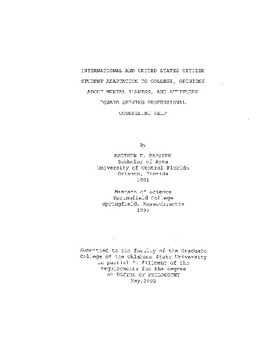| dc.contributor.advisor | Carlozzi, Alfred | |
| dc.contributor.author | Baysden, Matthew F. | |
| dc.date.accessioned | 2016-11-18T20:53:24Z | |
| dc.date.available | 2016-11-18T20:53:24Z | |
| dc.date.issued | 2002-05 | |
| dc.identifier.uri | https://hdl.handle.net/11244/46777 | |
| dc.description.abstract | Scope and Method of Study: This investigation was designed to explore and extend Wong's (1997) hypothesized component model in an effort to address the lack of a "Grand Theory" which has inhibited the understanding of international students' attitudes toward seeking professional psychological help. As such this study examined the influence that adjustment to college, opinions about mental illness, and attitudes toward seeking professional psychological help. As such this study examined the influence that adjustment to college, opinions about mental illness, and attitudes toward seeking professional counseling help had on United States citizen and international college student use of professional counseling. International student participants (n=111) and U.S. student participants (n=114) representing 31 different countries completed a demographic questionnaire, the Student Adaptation to College Questionnaire (SACQ: Baker & Siryk, 1989), the Opinions about Mental Illness scale (OMI: Cohen & Struening, 1962) and a modified Attitude Toward seeking Professional Psychological Help Scale (ATSSPH: Fischer & Turner, 1970). A structural regression model was utilized to examine if student origin influenced opinions about mental illness, student adaptation to college, and attitudes towards seeking professional psychological help. | |
| dc.description.abstract | Findings and Conclusions: The findings of this study support a multi-component model to understanding international students' use of counseling, as proposed by Wong (1997). More specifically, Opinions about mental illness, attitudes toward seeking professional psychological help, and adaptation to college, were significant in predicting international students lower use of counseling as compared to U.S. citizen students. This study supports that students with more negative stereotypical opinions about mental illness also report more negative attitudes toward seeking professional counseling help. Furthermore, college students indicating more negative stereotypical opinions about mental illness reported having more difficulty in adjusting to college than did students indicating less negative stereotypical opinions about mental illness. College students with more positive attitudes toward seeking professional help indicated a significantly better adjustment to college. Adaptation to college and attitudes toward seeking professional counseling help were not significant predictors in determining college students' use of counseling. | |
| dc.format | application/pdf | |
| dc.language | en_US | |
| dc.rights | Copyright is held by the author who has granted the Oklahoma State University Library the non-exclusive right to share this material in its institutional repository. Contact Digital Library Services at lib-dls@okstate.edu or 405-744-9161 for the permission policy on the use, reproduction or distribution of this material. | |
| dc.title | International and United States citizen student adaptation to college, opinions about mental illness, and attitudes toward seeking professional counseling help | |
| dc.contributor.committeeMember | Miville, Marie | |
| dc.contributor.committeeMember | Romans, John S. C. | |
| dc.contributor.committeeMember | Barnes, Laura L. B. | |
| osu.filename | Thesis-2002D-B361i.pdf | |
| osu.accesstype | Open Access | |
| dc.type.genre | Dissertation | |
| dc.type.material | Text | |
| thesis.degree.discipline | Educational Psychology | |
| thesis.degree.grantor | Oklahoma State University | |
